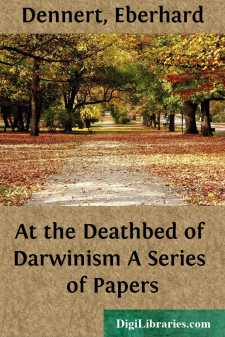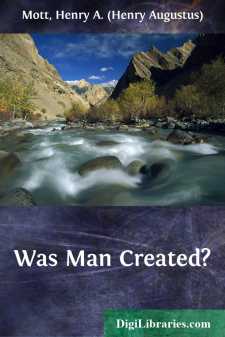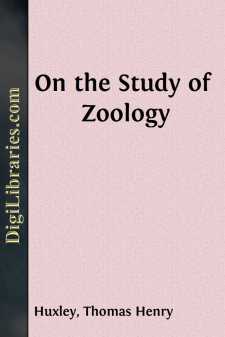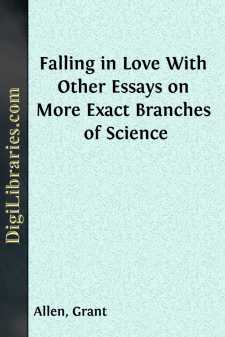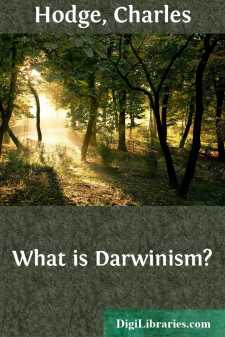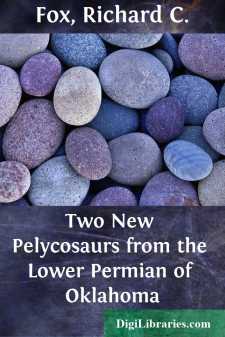Science
- Astronomy 18
- Biology 40
- Chemistry 13
- Electricity 1
- General 38
- History 6
- Light 1
- Paleontology 2
- Philosophy & Social Aspects 1
- Physics 3
- Relativity 2
- Study & Teaching 1
- Waves & Wave Mechanics 1
Science Books
Sort by:
THE NEW HEAVENS Go out under the open sky, on a clear and moon-less night, and try to count the stars. If your station lies well beyond the glare of cities, which is often strong enough to conceal all but the brighter objects, you will find the task a difficult one. Ranging through the six magnitudes of the Greek astronomers, from the brilliant Sirius to the faintest perceptible points of light, the...
more...
by:
Joseph Priestley
THE PREFACE. One reason for the present publication has been the favourable reception of those of my Observations on different kinds of air, which were published in the Philosophical Transactions for the year 1772, and the demand for them by persons who did not chuse, for the sake of those papers only, to purchase the whole volume in which they were contained. Another motive was the additions to my...
more...
by:
Eberhard Dennert
PREFACE. The general tendency of recent scientific literature dealing with the problem of organic evolution may fairly be characterized as distinctly and prevailingly unfavorable to the Darwinian theory of Natural Selection. In the series of chapters herewith offered for the first time to English readers, Dr. Dennert has brought together testimonies which leave no room for doubt about the decadence of...
more...
PREFACE. This work was originally written to be delivered as a lecture; but as its pages continued to multiply, it was suggested to the author by numerous friends that it ought to be published in book-form; this, at last, the author concluded to do. This work, therefore, does not claim to be an exhaustive discussion of the various departments of which it treats; but rather it has been the aim of the...
more...
NATURAL HISTORY is the name familiarly applied to the study of the properties of such natural bodies as minerals, plants, and animals; the sciences which embody the knowledge man has acquired upon these subjects are commonly termed Natural Sciences, in contradistinction to other so-called "physical" sciences; and those who devote themselves especially to the pursuit of such sciences have been...
more...
by:
Grant Allen
FALLING IN LOVE An ancient and famous human institution is in pressing danger. Sir George Campbell has set his face against the time-honoured practice of Falling in Love. Parents innumerable, it is true, have set their faces against it already from immemorial antiquity; but then they only attacked the particular instance, without venturing to impugn the institution itself on general principles. An old...
more...
by:
William Crookes
THE CHEMICAL HISTORY OF A CANDLE LECTURE I. A CANDLE: THE FLAME—ITS SOURCES—STRUCTURE—MOBILITY—BRIGHTNESS. I purpose, in return for the honour you do us by coming to see what are our proceedings here, to bring before you, in the course of these lectures, the Chemical History of a Candle. I have taken this subject on a former occasion; and were it left to my own will, I should prefer to repeat...
more...
by:
Charles Hodge
WHAT IS DARWINISM? This is a question which needs an answer. Great confusion and diversity of opinion prevail as to the real views of the man whose writings have agitated the whole world, scientific and religious. If a man says he is a Darwinian, many understand him to avow himself virtually an atheist; while another understands him as saying that he adopts some harmless form of the doctrine of...
more...
INTRODUCTION The Great War has caused a vast destruction of the sounder portion of the belligerent peoples and it is certain that in the next generation the progeny of their weaker members will constitute a much larger proportion of the whole than would have been the case if the War had not occurred. Owing to this immeasurable calamity that has befallen the white race, the question of eugenics has...
more...
by:
Richard C. Fox
In the course of examining material from fissure deposits of early Permian age collected from a limestone quarry near Fort Sill, Oklahoma, the author recovered several tooth-bearing fragments of small pelycosaurs. The fragments were examined, compared with descriptions of known kinds appearing in the literature, and determined to be new genera within the Nitosauridae (Edaphosauria) and Sphenacodontidae...
more...




